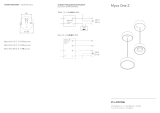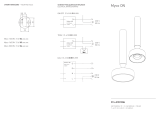
Electric Wheelchair
2015-11
Page 5
1.4 Inspection
In principle we recommend one inspection every year, and a minimum of one before usage is
resumed. All of the following checks must be performed and documented by authorized
persons:
Visually check the frame parts for plastic deformation, cracks and impaired functioning.
(basic frame, seat frame, back frame, side parts, footrests, legrests, motor suspensions).
Visually check all plastic parts for cracks and brittle spots.
Check the solidity and seating of all screws.
Visually check all housings for damage, screws must be securely fixed, seals and
gaskets should not exhibit visible damage.
Visually check for damage to the paintwork (danger of corrosion).
Check the plug connectors for corrosion or damage, since it could affect the efficiency of
the electronics.
Check the operation of the tyres (free running, level rolling, axle play, tyres, profile,
condition of the rims, air pressure in the case of air tyres, floating axles, etc.).
Verify the amount of grease on the metal joints of movable parts.
Check the functioning of the armrests, footrests and legrests (locking, load, deformation,
wear caused by loads).
Check the operation of other detachable parts (example: personal safety belt, battery
housing, fitting back/seat, etc.).
Check the cabling (especially for: crushing, abrasion, cuts, visible insulation of the inner
conductor, visible metallic veins, kinks, lumpiness, color changes of the outer sleeve,
brittle spots).
Electric leads to be securely placed to avoid shearing, crushing and other mechanical
stresses and strains.
For the charger of the electric wheelchair measure the resistance of the protective braid
(O) according to VDE 0702-1.
For the charger of the electric wheelchair measure the residual diversion current (A)
according to VDE 0702-1.
For the charger of the electric wheelchair measure insulation resistance (MO) according
to VDE 0702-1.
Check the functioning of the drives (during a test drive noises, speed, free running,
etc.), if necessary: Measure the performance, first with no load and then with the
nominal load ("SWL"), to check for wear and tear of the motors by comparing the values
of the electric current with the values when the electric wheelchair was delivered.
Check the motors for adjustments (seat inclination, backrest inclination, lift column).
Check the condition of the batteries, covers and tubes.
Remove carbon dust of carbon brushes and if necessary replace carbon brushes.
Completeness of the delivery condition, instruction manual available?
Higher performance and/or high utilization (daily use or use on difficult terrain), increase the
inspection intervals for wear parts (carbon brushes, pollution motor, tyre profile, ...) to at least
half-yearly review.
Checking measurements may only be carried out by skilled persons trained on the
wheelchair and at least under the supervision of an electrician who knows the checking
instruments and processes. Only an electrician is able to release the electric wheelchair for
use after performing measurements or servicing.
The service must only be confirmed in the maintenance plan if a minimum of all the above-
mentioned aspects have been checked.




















